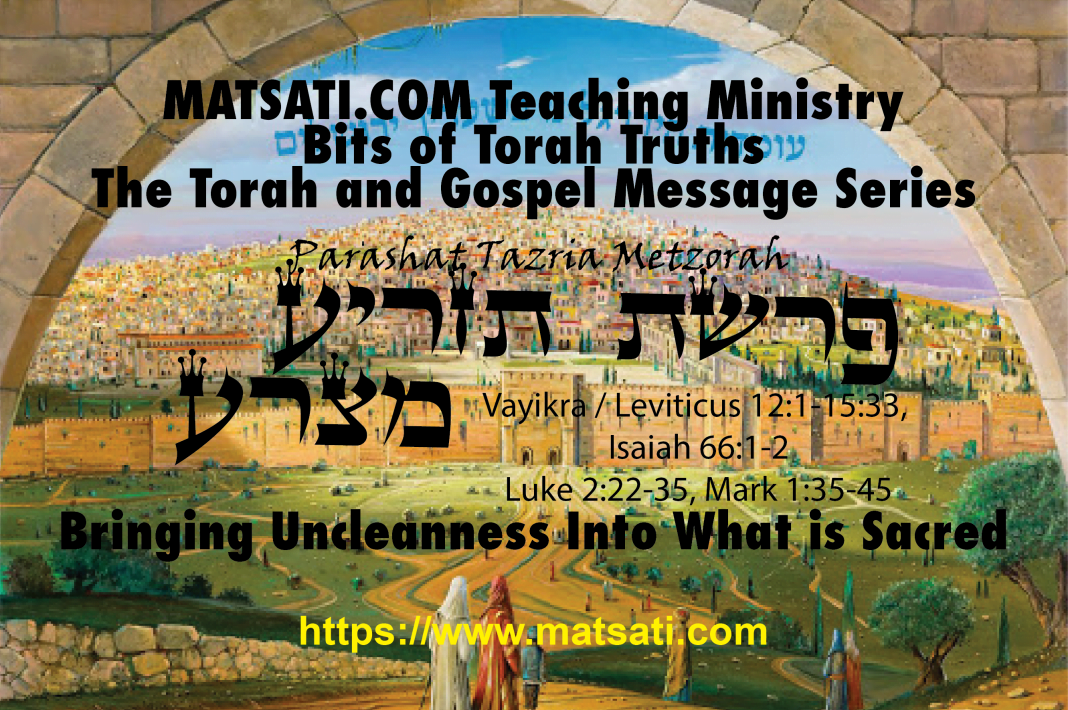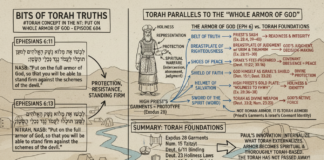Searching the Torah, the word קֹדֶשׁ meaning “holiness” appears in the book of Vayikra / Leviticus 48 times.
קֹדֶשׁ
Bereshit / Genesis 3 X
Shemot / Exodus 31 X
Vayikra / Leviticus 48 X
Bamidbar / Numbers 16 X
Devarim / Deuteornomy 6 X
Holiness is something that we receive from God, it is a gift, it comes by faith, and it is being set apart, sacred, and beloved of God. This is what we read in Vayikra / Leviticus 20:8 which states, “Keep my decrees and follow them. I am the LORD, who makes you holy.” (NIV) This is not about wrapping ourselves up in religious rituals, it is about allowing the Lord God of Israel to redeem us to be with Him, and about our obeying His Word. This describes the Lord God who raises us up into what is sacred, separating us from all that is sinful and profane. In Parshiyot Tazria and Metzora, we are given a lot of information in regard to uncleanness, impurity (tumah, טֻמְאָה), and purity (tahor: טָהוֹר). On purity, the Torah defines that which is pure, as in the gold that is used for the construction of the Tabernacle, and that which is ceremonially clean, as in the animals which are fit for sacrifice, water used for purification, vessels, clothing, and people. In Hebrew, this word for purity (tahor: טָהוֹר) may also refer to one having pure eyes (Habakkuk 1:13), clean words (Tehillim / Psalms 12:6), a pure heart (Tehillim / Pslams 19:10, 51:12), and of clean hands (Job 17:9). On impurity, tumah (טֻמְאָה) we get the idea of contamination, there is personal uncleanness which is described as childbirth, menstruation, bodily emissions, skin diseases, or contact with a corpse. Tumah may also refer to ethical uncleanness as in reference to sin, iniquity, and transgression. According to Vayikra / Leviticus 15, when one has an uncleanness by reason of a discharge from the body, whatever he touches becomes unclean (15:7), everything on which he sits becomes unclean (15:4), anyone who touches his bed becomes unclean (15:5), whoever sits on the thing that he sat upon becomes unclean (15:6). In addition, if the unclean person spits upon someone else, he becomes unclean (15:8), the text repeats saying what he sits upon and everything he touches as being unclean and those who touch those things also become unclean (15:9-11). The Torah goes on to say clay vessels that were touched are to be broken (15:12), and when a person is cleansed from the discharge, he is to wait seven days for his cleansing to be complete, and he is to wash his cloths and body in running water (יִשָּׁטֵף בַּמָּיִם). The text describes the transmittance of uncleanness to objects and to others. What is being taught is concerning holiness and separation through the clean vs unclean descriptions, the two do not mix. (Vayikra / Leviticus 7:20-21, Bamidbar / Numbers 5:2-3) Note how some situations which are commendable, cause one to become unclean, for example, taking care of the sick, delivering a baby, burying the dead, etc. Even in certain parts of the ritual service in the Tabernacle caused the priest to become unclean (see Vayikra / Leviticus 16:26-28, Bamidbar / Numbers 19:7-8). All of these things teach us a very important spiritual truth. This is found in the procedure for making the waters of purification, the red heifer sacrifice. The red heifer was burned up as a whole burnt offering, and the priest who mixed its ashes with water became tamei (unclean). The one who was then sprinkled with the ash/water mixture became tahor (pure). The imagery that we receive here is of the priest out of love gave up his own purity so that another person could regain his purity. The significance of these things is that impurity is not the same as sinfulness, even though it is a sin to bring uncleanness into what is sacred.
In 2 Corinthians 7:1 Paul speaks to us saying “cleanse” (καθαρίσωμεν) yourselves in a ceremonial sense (καθαρίζω, to make clean, cleanse, from physical stains and dirt, utensils, food, a leper, to cleanse by curing, to remove by cleansing, in a moral sense, to free from defilement of sin and from faults, to purify from wickedness, to free from guilt of sin, to purify, to consecrate by cleansing or purifying, to consecrate, dedicate, to pronounce clean in a levitical sense). Paul uses these words which are closely connected to ritual purity “Tahor” (טָהוֹר)? The Apostle Paul also tells us to Sanctify (קדשתנו, kidshanu) ourselves in the fear of God (בְּיִרְאַת אלהים). Was Paul telling us to make ourselves “spiritually clean?” Certainly not! He understood the Torah description of clean and unclean, and is describing the importance of purity, for drawing close to God, connecting this to our faith in the Messiah Yeshua, God’s sacrificial provisions. Paul knew that spiritual cleansing was a work of God which is known in the Torah as the circumcision of the heart. This is related to the impurity that comes from within, something the sprinkling of the ashes of the red heifer could not do, i.e. convey purity on the inside. The Spiritual cleansing Paul is speaking of, the circumcision of the heart, is a work of God and His Holy Spirit. Paul is saying that we are called to live holy, separate, and sanctified lives. How do we do that? Fortunately for us God’s Word tells us exactly how to do that. Faith in the efficacy of the sacrifice leads to sanctification (making us holy) which is the mercy of God by which a person may then draw near to the God of Israel. Unbelief on the other hand leads to defilement (uncleanness) which is the path whereby one walks away from the Divine Presence. The process of Sanctification is all about faith and is also connected to how we live out our faith (being faithful). Note how the Lord God Almighty has sanctified us in his Son Yeshua the Messiah. Because of this, we too are to sanctify our lives by living and walking in God’s ways! The way we sanctify ourselves again is by separating ourselves like Paul said in 2 Corinthians 6:17 “Wherefore come out from among them, and be ye separate, saith the Lord, and touch not the unclean thing; and I will receive you…” Paul describes the standard by which God’s people are to live by in his description on inheriting the kingdom of God according to Ephesians 5:5 For this ye know, that no whoremonger, nor unclean person, nor covetous man, who is an idolater, hath any inheritance in the kingdom of Christ and of God. (KJV) Another example may be taken from the dietary commands. Those foods God says are unclean and we are not to eat, and those foods the Lord says are clean and we are to eat. We are given these commands so that we can practice הַבְדָּלָה (Havdalah) “separation from the world.” This is the foundation stone of the Torah, and consequentially a fundamental part of our relationship with God and His Messiah in faith, faithfulness, righteousness, and holiness in our day to day lives.
The Gospel Message is incorporated into the message of the Torah as a foreshadowing of what God has planned for His people, He dwells in our midst, we live by faith, and obey His Word. When the Lord God of Israel dwells in our midst, He brings healing into our lives. In addition to this, we learn according to the Torah that it was the blood that was given by God that was used for our atonement upon the altar. The curse of the Torah revealed the desperate need that each and every one of us has for a Deliverer. We need a deliverer not just from captivity in this world (externally), we need a deliverer who is able to save us from the captivity that is within, from sin and unrighteousness. This is what makes the message of the Gospel so significant, of God dwelling in our midst, enabling us to overcome not just the world, but delivering us from sin. The sanctifying power of God is what makes the difference in our lives by helping us to live our lives according to God’s Word. This is why redemption is an ongoing process. Notice something here the Torah states, Shemot / Exodus 6:6-8 (שמות ו:ו-ח) וְהוֹצֵאתִי… וְהִצַּלְתִּי… וְגָאַלְתִּי… וְלָקַחְתִּי… וְהֵבֵאתִי אֶתְכֶם אֶל הָאָרֶץ “And I will take you out…and I will save you…and I will redeem you…and I will take you to Me as a people…and I will bring you to the land…” Redemption is an ongoing process as described here in Jewish history that includes both the physical redemption of God’s people as well as the psychological redemption from the attitudes that enslave us. We are redeemed from bondage, not only to show us our need for the Lord, but also to show us our inability to live without the blessing and strength of God. This ties in the message of the Gospel concerning the inner corruption of sin, and the forgiveness of God according to His mercy/grace. We learn from the Tabernacle service how the altar of God was to cleans the unclean sinner so that he or she may draw near to a Holy God. This is the result of the nature of separation of the profane and the holy, of the unclean and the clean. The unclean person could not make contact with God without the death penalty. As a result of this, the Lord God established the blood of the sacrifice for cleansing and purification from sin. (see Vayikra / Leviticus 17:11, Hebrews 9:22) We are set free from the bondage to our sin by Yeshua, and the evidence for the power of God to do these things is found in the newness of life, the changed life, the new desire and way of being. It is the grace of God, His powerful love working within us by His Holy Spirit, is the means by which we are truly changed. The Torah is written upon our hearts (Jeremiah 31:31-34), the word of God literally becomes a part of us, God’s will is placed upon our hearts as we trust in Him, in his love and forgiveness. This is what it means to be empowered by the Holy Spirit of God (1 Corinthians 2:15). Repentance is a part of this process, the Spirit of God dwelling within causes us to repent (perform Teshuvah) leading us to do God’s will, for the blessing of life (living according to God’s Word). God’s Word is life, where living faithfully before the Lord is practicing the presence of God, believing in the Messiah Yeshua, and abiding in His love. All of these things teach us how walking in love changes our focus and direction so that we live according to God’s will for our lives according to His Holy Word! What these things teach us about following in the footsteps of Yeshua is not a sort of “moral reformation” or “self-improvement” such that we can make ourselves acceptable before God. Yeshua is Lord and Savior, Master, and we find salvation in His acts of deliverance done on our behalf and for our benefit. We emphasize the roll of the Messiah in our lives, and the act of God working in our hearts to live for Him! We do not emphasize our own obedience because it is God who justifies, it is His Spirit dwelling within that empowers us, it is His Work that causes us to be successful in living our lives according to His Word, and it is the Lord God of Israel who transforms the human heart! All things lead back to the world of God in our lives, which illustrates how in Him and through Him all things have their being! (Colossians 1:17)









